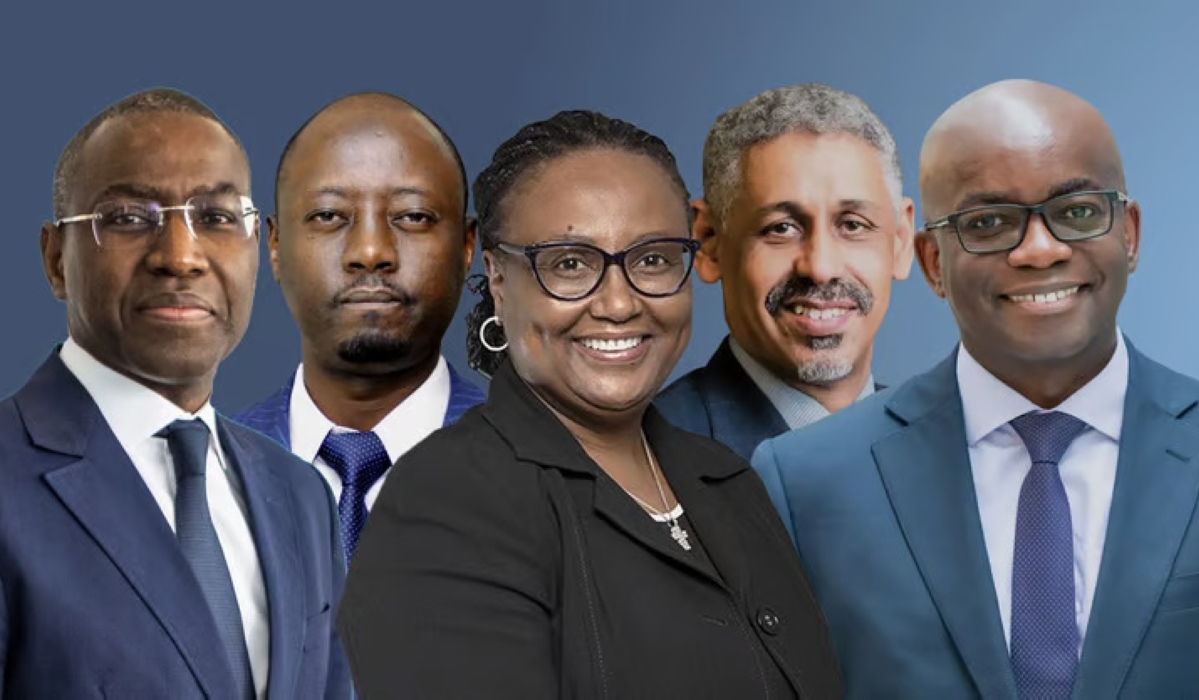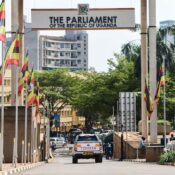
Four men and a woman: What are the aspirations and visions of the candidates for the leadership of the AfDB?
We briefly examine the backgrounds, beliefs, and objectives of each candidate, who is selected from various parts of the continent.
Amadou Hott of Senegal, Samuel Munzele Maimbo of Zambia, Sidi Ould Tah of Mauritania, Abbas Mahamat Tolli of Chad, and Bajabulile Swazi Tshabalala of South Africa are the five contenders vying for the position of president of the African Development Bank (AfDB) Group in the May 29 elections.
Akinwumi Adesina, who is finishing his second and last term in office, will be replaced by the victorious candidate, who will hold office for a five-year renewable term. The vote will be held during the AfDB’s 2025 Annual Meetings, which will be held in Abidjan, Côte d’Ivoire, from May 26 to 30.
At this point, it is difficult to predict who will be able to persuade AfDB member states of their vision for the bank’s future and, consequently, successor Adesina, who has led one of Africa’s most significant financial organizations since 2015. Here, we briefly examine the backgrounds, beliefs, and objectives of each candidate, who is selected from various parts of the continent.
Hott Amadou (Senegal)
Amadou Hott, 52, is a former corporate executive, AfDB vice president, and minister of economy, planning, and cooperation for Senegal, a west African nation. The goal of his effort is to hasten Africa’s sustainable development and independence. By simplifying procedures and luring outstanding people, he emphasized on his X account the necessity for a more impactful and nimble AfDB.
To reduce Africa’s financial gap, Hott promotes the use of local resources, the development of capital markets, and the mobilization of private investment, particularly in areas like energy, infrastructure, and digital transformation. “I’m committed to guiding Africa toward further independence and sustainable development. To close the financing gap, we must mobilize domestic resources, capital markets, and private sector investments,” he stated.
“I think that in order to propel growth in important areas like energy, infrastructure, and digital transformation, the AfDB needs to become more flexible, inventive, and influential. We can realize Africa’s full potential and secure a prosperous, self-sufficient future by optimizing procedures and luring top personnel.
Zambian Samuel Munzele Maimbo
52-year-old Maimbo of Zambia, a former World Bank Vice President, served as the organization’s Chief of Staff and Director of Resource Mobilization throughout his three-decade tenure. During the COVID-19 epidemic, he oversaw the $93 billion IDA20 replenishment, allocating over 70% of pledges to Africa. Maimbo’s background on a Lusaka farm has influenced his vision, which he shares on his X account. Agriculture is a strategic and personal priority for him.
He described “realistic measures to revolutionize African agriculture – not through theoretical frameworks, but through focused investments that yield tangible outcomes for our farmers and communities” in a video.
“I grew up on a farm outside of Lusaka, where I saw firsthand the difficulties our farmers face as well as the honor of agricultural labor,” he remarked. For me, this is a personal matter rather than an abstract policy. 60% of the world’s uncultivated arable land is in Africa, yet we import $45 billion worth of food every year. Our greatest opportunity is represented by this contradiction.
Tshabalala Bajabulile Swazi (South Africa)
The 59-year-old South African Bajabulile Swazi Tshabalala is the Chief Financial Officer and Vice President for Finance at the African Development Bank. She has worked in development banking, infrastructure finance, and hybrid capital structuring for more than 30 years. Tshabalala, the sole female candidate, has emphasized the significance of inclusive economic reform.
Her goals include promoting green growth, facilitating digital innovation, and increasing financial accessibility. After joining the AfDB in 2018, Tshabalala was named Senior Vice President in 2021. She remained in that role until 2024, when she resigned to run for president. She graduated from Wake Forest University with an MBA and Lawrence University with a BA in Economics.
She presented her vision for the AfDB in February, highlighting the importance of transformative growth, strategic alliances, and financial stability.
“Africa is at a turning point, and the AfDB needs to step up and take decisive, strategic action to accomplish the continent’s goals. In order to realize Africa’s full economic potential, I envision an AfDB that is financially sound, results-oriented, and emphasizes infrastructure while expanding creative financing options and fortifying alliances. Delivering genuine, long-lasting effect for African countries and their citizens is more important than merely making investments, she said.
Ould Tah Sidi (Mauritania)
The Arab Bank for Economic Development in Africa (BADEA), a development bank owned by the Arab League that offers development finance to African nations, is presided over by Ould Tah, 61, of Mauritania. He has more than thirty years of expertise in international development, finance, and economics.
From 2006 until 2008, Tah served as the President’s and Prime Minister’s advisor. He was proposed as the Minister of Finance and the Economy in July 2008. Prior to being appointed Director General of BADEA, he served as Minister of Economic Affairs and Development from 2008. He has been in charge of BADEA since 2015, promoting international initiatives. Tah has also served as a consultant to Mauritania’s senior executives and represented his nation at international financial organizations such as the World Bank and AfDB.
During his candidacy, he advocated for a comprehensive internal reform of the AfDB that would be results-driven, decentralized, and digitally changed. He asserts that the Bank transforms from a financial institution into a catalyst for change by coordinating institutional culture with the objectives of the continent. In order to assist African nations, he envisions AfDB raising $400 billion a year through blended finance, green bonds, and AAA-backed risk assurances.
He urged Africa to maximize all of its resources for sustained prosperity, saying that women and youth are not a burden but rather the engine of growth.
Chad’s Abbas Mahamat Tolli
A seasoned economist, 53-year-old Abbas Mahamat Tolli of Chad was the governor of the Bank of Central African States (BEAC) before spearheading important reforms to increase financial stability. He established a solid reputation in fiscal governance while serving as Chad’s Minister of Finance and Chief of Staff to the Head of State. In a post on X, Tolli pointed out that his five-pillar development model, which emphasizes agricultural sovereignty, infrastructure, governance, ecological sustainability, and domestic capital markets, is in line with the African Union’s Agenda 2063 and the objectives of the AfDB.
He advocates for lessening Africa’s need on outside funding and views obstacles like energy poverty and restricted intra-African trade as chances. He asserts that Africa’s tenacity, youth, and natural resources allow it to recreate itself.
He wrote on X that “if we are to realize our vision of a prosperous Africa for tomorrow, mobilizing the private sector must be a top priority.” The continent’s future depends on our capacity to close the large infrastructure deficit, which is expected to cost about $150 billion a year. The African Development Bank (AfDB), which acts as a catalyst for private funding in addition to being a donor, is essential to this endeavor.
He suggests a three-pronged strategy to successfully mobilize private investment and address these issues: luring investors with de-risking techniques, establishing regional platforms for project structuring, and putting Africa at the forefront of digital technology.
All Categories
Recent Posts
Tags
+13162306000
zoneyetu@yahoo.com



